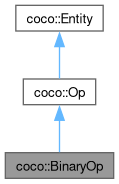Op with two arguments. More...
#include <Op.h>

Public Member Functions | |
| BinaryOp () | |
| BinaryOp (const BinaryOp &)=delete | |
| BinaryOp (BinaryOp &&)=delete | |
| virtual | ~BinaryOp ()=default |
| uint32_t | arity (void) const final |
| Return the number of arguments (# of child Ops) | |
| Op * | arg (uint32_t n) const final |
| Return N-th argument. | |
| std::set< Object * > | uses (void) const final |
| Return a set of object(s) used during execution. | |
| Op * | left (void) const |
| void | left (Op *op) |
| Op * | right (void) const |
| void | right (Op *op) |
 Public Member Functions inherited from coco::Op Public Member Functions inherited from coco::Op | |
| virtual | ~Op () |
| template<typename T > | |
| T | accept (IVisitor< T > *v) const |
| template<typename T > | |
| T | accept (IVisitor< T > &v) const |
| template<typename T > | |
| T | accept (IVisitor< T > &&v) const |
| void | accept (IMutator *m) |
| void | accept (IMutator &m) |
| void | accept (IMutator &&m) |
| Instr * | parent (void) const |
| Op * | up (void) const |
| Return a pointer to the parent Op. | |
 Public Member Functions inherited from coco::Entity Public Member Functions inherited from coco::Entity | |
| virtual | ~Entity ()=default |
| Module * | module (void) const |
Detailed Description
Constructor & Destructor Documentation
◆ BinaryOp() [1/3]
|
explicit |
◆ BinaryOp() [2/3]
|
delete |
◆ BinaryOp() [3/3]
|
delete |
◆ ~BinaryOp()
|
virtualdefault |
Member Function Documentation
◆ arg()
|
finalvirtual |
Return N-th argument.
- Note
- The behavior of arg(n) is defined only when n < artiy()
Implements coco::Op.
Definition at line 111 of file Op.cpp.
◆ arity()
|
finalvirtual |
◆ left() [1/2]
|
inline |
◆ left() [2/2]
|
inline |
Definition at line 233 of file Op.h.
References coco::Part::child().
Referenced by arg(), tflimport::DivGraphBuilder::build(), tflimport::SubGraphBuilder::build(), uses(), OpPrinter::visit(), OpPrinter::visit(), OpPrinter::visit(), OpPrinter::visit(), and OpPrinter::visit().
◆ right() [1/2]
|
inline |
◆ right() [2/2]
|
inline |
Definition at line 237 of file Op.h.
References coco::Part::child().
Referenced by arg(), uses(), OpPrinter::visit(), OpPrinter::visit(), OpPrinter::visit(), OpPrinter::visit(), and OpPrinter::visit().
◆ uses()
|
finalvirtual |
Return a set of object(s) used during execution.
NOTE There is no 'def' method as Op is not allowed to define a new object
Implements coco::Op.
Definition at line 118 of file Op.cpp.
The documentation for this class was generated from the following files: